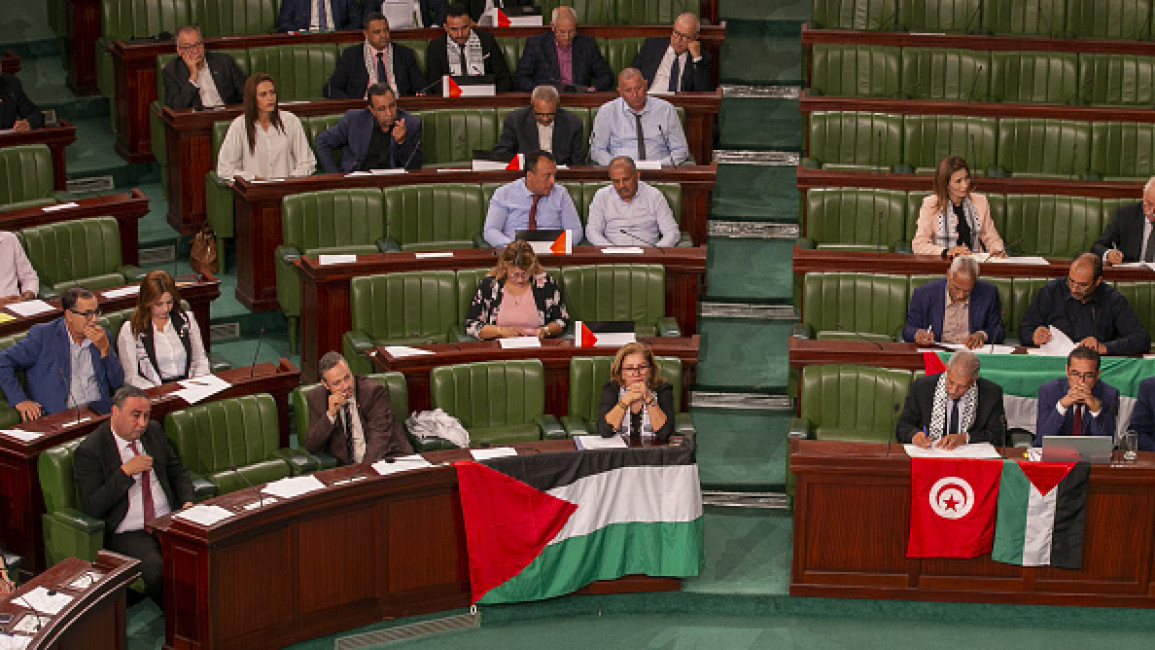Tunisia imposes travel ban on lawyer Chawki Tabib representing Palestine in ICJ genocide case
Tunisian authorities have reportedly banned renowned lawyer Chawki Tabib from leaving the country on his way to represent the Palestine Bar Associations in South Africa's genocide case against Israel in the International Court of Justice (ICJ).
"This is the only day I wished to be outside Tunisia," wrote the Tunisian lawyer and former head of Tunisia's Anti-Corruption Authority (INLUCC) on 11 January after the incident.
The Palestine Bar Association has assigned the renowned Tunisian lawyer as a legal representative among the international team of lawyers representing Palestine and supporting South Africa's case against Israel's genocide in Gaza at the Hague.
"Upon the authorisation of the Palestinian Bar Association, I filed a complaint today, December 6, 2023, with the Prosecutor of the International Criminal Court in The Hague against war criminals, killers of Palestinian children, and leaders of the Zionist entity," announced Tabib in December 2023, during his last trip abroad before going back to Tunisia.
Tabib was scheduled to attend preparation meetings in Kuwait from 9-10 January before heading to the Hague.
Local media Al-Hourria said a travel ban was issued against the lawyer in January following a complaint filed against him by the Free Bloggers Network, a local organisation that 'exposes fraud and corruption,' according to their Facebook page's posts.
Over social media, several commentators have interpreted the travel ban against Tabib as another attempt by the state to quell the movements of its opponents. Amnesty Rights group has accused President Saied of imposing arbitrary travel ban against at least 50 activists and politicians since his power grab.
The New Arab contacted Tabib for further details, but he did not respond by the time of publication.
In 2020, Elias Fakhfakh, Tunisia's Prime Minister at the time, dismissed Tabib, the head of Tunisia's INLUCC, from his duties.
The government did not clarify the reason for the dismissal of Tabib, who was appointed to this position in January 2016.
Tabib's dismissal came a few months after INLUCC announced the referral of documents related to the declaration of assets and suspicions of conflicts of interest against PM Fakhfakh. At the time, several NGOs and lawyers condemned the dismission of Tabib as 'anti-constitutional.'
Since his dismissal, Tabib has been the target of several complaints, including one by former PM Fakhfakh, who has accused him of tarnishing his reputation for 'political ends'. Tabib has denied all accusations.
Leaving the INLUCC, Tabib focused on his legal career, with little interest in politics.
"I don't have any personal issues with President Kais Saied. However, I was surprised to find him endorsing some unjust decisions made against me. (...) I was surprised because he did not seek justice for me," said Tabib in an interview with Arabi21 in 2022.
President Saied and his government have refused to endorse any legal actions against Israel, arguing that such a move would be an implicit recognition of 'the Zionist entity' (Israel).
However, a group of Tunisian lawyers is set to present verbal claims in Israel at The Hague in February but will not formally participate in the case, according to a press release by Tunisia's foreign ministry on 10 January.
"The country decided to join these hearings instead because they extend beyond the legal qualification of the massacres in Gaza, addressing fundamental questions for the Palestinian people," added the ministry's statement that many activists deemed confusing and controversial.



